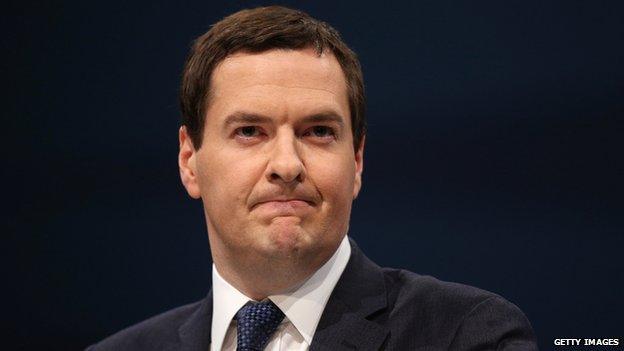Who wins from Google tax?
- Published
- comments

The Chancellor wants multinationals to pay their "fair share" of tax
Perhaps what's most interesting about the government's planned new Diverted Profits Tax, AKA the "Google" tax, is how much noise and debate it has generated, for precious little potential revenue.
The Treasury estimates it will raise £360m a year by 2017/18, which isn't even really a drop in the ocean of this year's £91bn shortfall in what the state is raising in taxes relative to what it spends: the Google tax ain't going to fill the UK's huge and intractable public-sector deficit.
And yet it represents something of a revolution in tax policy, in that it introduces the idea that the volume of sales in a particular country should determine the tax paid in that country - over-riding the current presumption that companies should pay most of their tax on their home turf, and that it is perfectly reasonable for them to exploit different tax rates applicable in different countries to minimise their global tax bill.
In imposing the tax, George Osborne is responding to significant public anger over how little tax is paid in the UK by the new breed of mainly US and mainly tech-based multinationals, of which Google is unlucky enough to have become the poster child, but which also include Apple, Amazon and Starbucks, inter alia.
The new tax rules have been drafted to exclude small and medium size companies from its reach, and to include companies that do or will sell in the UK without in any sense being permanently resident here - which could, for example, include the likes of the youngest breed of technology giants such as WhatsApp (since they could theoretically have substantial turnover in the UK via smartphone apps, for example, without employing a single person here).
However it is not crystal clear how HMRC will calculate the diverted profits on which to base the 25% diverted profits tax. Considerable discretion appears to have been left to the taxman or taxwoman.
Perhaps the most important disclosure in draft legislation published today is that if HMRC concludes that a company, such as Google or Starbucks, is deliberately under-stating or wiping out its profits by charging its UK operations too much for the use of overseas-owned intellectual property - for example - it would be able to disallow 30% of those charges or expenses.
Now because the Securities and Exchange Commission in the US forces American companies to publish considerable detail on where they generate sales in the world (Google for example generates 11% of its $60bn turnoved in Britain), HMRC may be able to obtain fairly robust data on the allegedly unfair tax avoidance devices used by US businesses - and may be able to exploit that in determining what tax they should pay in Britain.
But how is it to calculate what a Chinese multinational should pay, since China does not exactly operate to gold-standard accounting and disclosure rules?

George Osborne announced his Diverted Profits Tax in the Autumn Statement
And another thing.
The UK is apparently the first country in the world to impose this new breed of allegedly unavoidable corporate tax that's based on revenues derived in one country. Which raises the intriguing question of what impact it would have on UK companies if other countries followed our lead.
If for example the US decided to impose a tax calculated with reference to US revenues on all companies, that could be quite costly for British multinationals, such as GlaxoSmithKline, BP and Barclays, all of which are big in America.
Given that the UK is an economy driven by huge multinationals, it is not immediately obvious that it would be good for the health of the UK economy if our multinationals were whacked for more tax in this way.
Not that I expect many of you to be weeping for them. Which is to say that the motivation for the Diverted Profits Tax is at least as much about generating votes as generating cash.